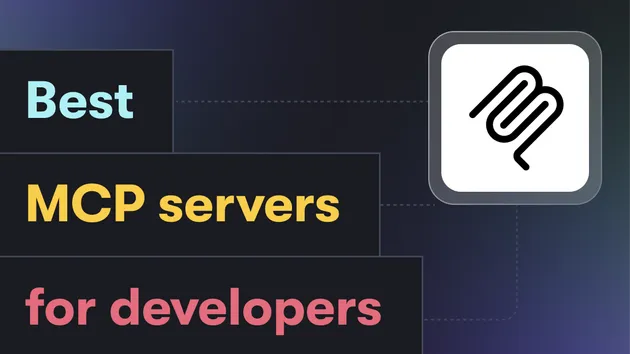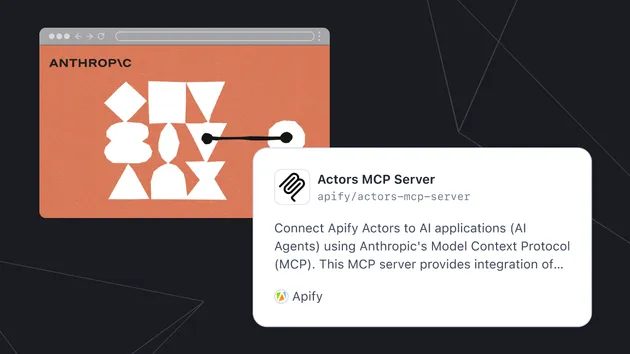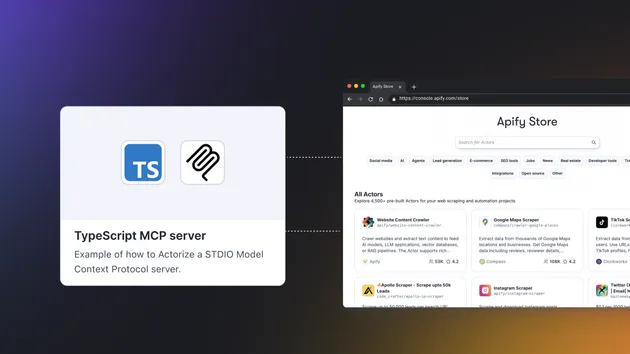Openapi To Mcp Converter
Pricing
$500.00 / 1,000 openapi url processeds
Go to Apify Store

Openapi To Mcp Converter
Convert any OpenAPI specification into a Model Context Protocol (MCP) server that AI assistants can use to interact with REST APIs.
Pricing
$500.00 / 1,000 openapi url processeds
Rating
0.0
(0)
Developer

TheGuide
Maintained by Community
Actor stats
0
Bookmarked
5
Total users
0
Monthly active users
5 months ago
Last modified
Categories
Share
Convert any OpenAPI specification into a Model Context Protocol (MCP) server that AI assistants can use to interact with REST APIs.
Features
- Universal OpenAPI Support: Works with OpenAPI v3.0 and v3.1 specifications
- Flexible Input: Accept OpenAPI specs from URLs or raw JSON/YAML strings
- Smart Filtering: Include/exclude endpoints using regex patterns
- Authentication Support: Bearer tokens, API keys, and basic auth
- Multiple Output Formats: Generate MCP server packages, JSON manifests, or both
- Production Ready: Includes error handling, validation, and structured logging
How It Works
- Input: Provide an OpenAPI specification URL or raw spec
- Parse: Extract endpoints, parameters, request/response schemas
- Transform: Convert each endpoint into an MCP tool with proper schemas
- Generate: Create a ready-to-use MCP server package or JSON manifest
- Deploy: Use the generated MCP server with any AI assistant
Input Parameters
Required
- openapiSource (string): URL or raw JSON/YAML of the OpenAPI specification
Optional
- serverName (string): Unique identifier for the MCP server (default:
openapi-mcp-server) - serverDescription (string): Human-readable description
- includeEndpoints (array): Regex patterns to include specific endpoints
- excludeEndpoints (array): Regex patterns to exclude endpoints
- authentication (object): Auth configuration
type:none,bearer,apiKey, orbasictoken: Bearer token or API key valueapiKeyHeader: Header name for API key (e.g.,X-API-Key)username: For basic authpassword: For basic auth
- baseUrl (string): Override the base URL from the spec
- outputFormat (string):
mcp-package,json-manifest, orboth(default:both) - includeExamples (boolean): Include examples in tool descriptions (default:
true) - maxEndpoints (integer): Maximum endpoints to process (default:
100, max:500)
Output
Dataset
Each run produces a dataset with:
- Summary record: Overview of processed endpoints
- Endpoint records: Detailed info for each API endpoint including MCP tool name
Key-Value Store
- manifest.json: Complete MCP manifest with all tools and metadata
- mcp-server.zip: Ready-to-deploy MCP server package (includes
package.json,index.js,README.md)
Usage Examples
Basic Usage
With Authentication
With Endpoint Filtering
From Raw YAML
Deploying the MCP Server
After the actor completes:
- Download
mcp-server.zipfrom the key-value store - Extract the archive
- Install dependencies:
npm install - Run the server:
node index.js - Connect it to your AI assistant (Claude Desktop, etc.)
Example MCP Configuration (Claude Desktop)
API Integration
Use the Apify API to automate OpenAPI to MCP conversion:
Use Cases
- API Integration: Make any REST API accessible to AI assistants
- Legacy API Modernization: Bridge old APIs with modern AI tooling
- Rapid Prototyping: Quickly test AI interactions with APIs
- Multi-API Orchestration: Create multiple MCP servers for different services
- Developer Tools: Generate MCP servers for internal APIs
Limitations
- Only supports OpenAPI v3.0 and v3.1
- Complex authentication flows (OAuth2, etc.) require manual customization
- Generated MCP server code is a starting point and may need refinement for production
- Maximum 500 endpoints per run
Technical Details
- Runtime: Node.js 18+
- Dependencies:
apify,openapi-types,yaml,zod,archiver,fs-extra - Output: MCP SDK v1.0+ compatible servers
Troubleshooting
"Failed to fetch OpenAPI spec"
- Verify the URL is accessible
- Check if authentication is required for the spec endpoint
- Ensure the URL returns valid JSON or YAML
"No endpoints found"
- Check your include/exclude patterns
- Verify the OpenAPI spec has valid paths
- Increase
maxEndpointsif needed
"Invalid OpenAPI specification"
- Ensure the spec is valid OpenAPI v3.0 or v3.1
- Use an OpenAPI validator to check the spec first
- Try converting v2.0 (Swagger) specs to v3.0 first
Support
For issues, feature requests, or questions, please open an issue on the actor's repository.




